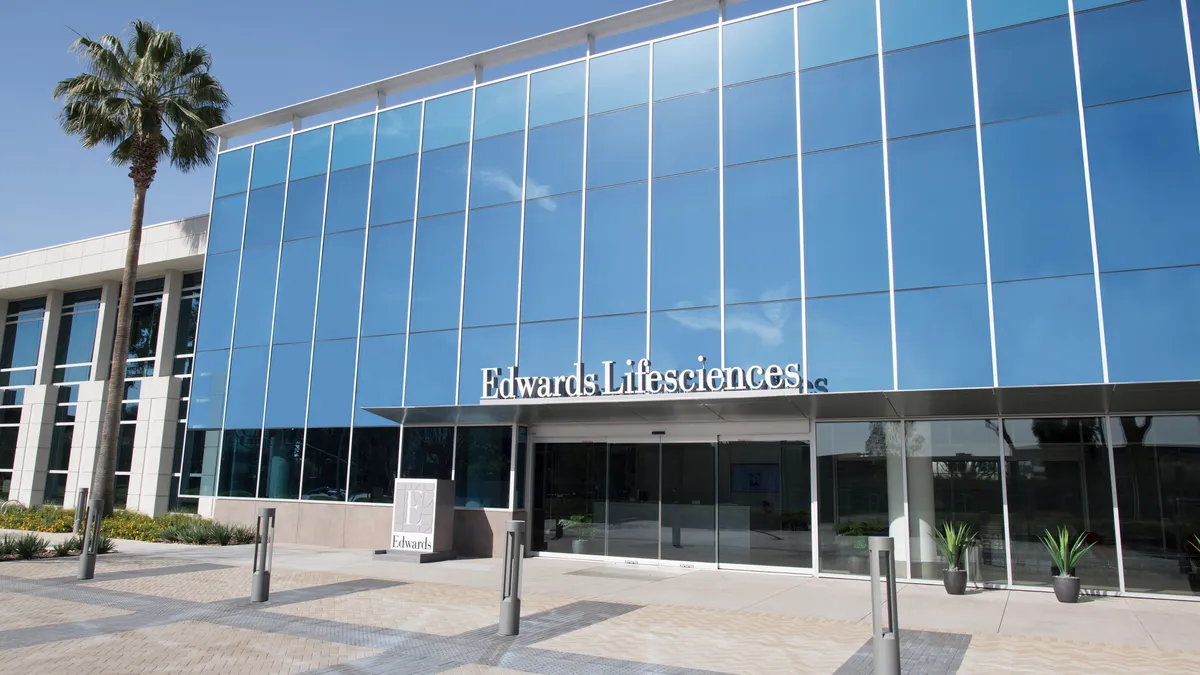Dive Brief:
- Edwards Lifesciences executives told investors Tuesday evening the company anticipates FDA will approve its Sapien 3 transcatheter aortic valve replacement products for patients with low surgical risk during the third quarter.
- Coming off a second quarter with total underlying sales growth up 14% to $1.1 billion, largely driven by interest in TAVR, the company said it will discontinue its Centera program due to the costs associated with expanding its indications to match the Sapien 3 valve.
- CEO Mike Mussallem told investors the jump in TAVR growth could not be pegged to just one factor, but cited a study finding the Sapien 3 valve was superior to open heart surgery for low surgical risk patients, variability between the first and second quarter and CMS' proposed national coverage determination.
Dive Insight:
The decision to cease production of Centera comes weeks after the company issued an urgent field safety notice, warning some physicians were having difficulty tracking and manipulating the system through the aortic arch, resulting in serious events related to vascular injury in 1.5% of cases.
"While the Centera valve has demonstrated excellent clinical outcomes and is performing well for patients, the time and resources required to optimize deliverability as well as expanding the indications to match Sapien 3 are significant," Mussallem told investors.
Stifel analysts noted Centera only had limited commercialization and an U.S.-based intermediate risk trial underway. Mussallem said Edwards anticipates FDA will approve the company's application for an expanded indication for Sapien 3 due to questions from the agency winding down.
"It makes us feel we're pretty close," Mussallem said. "One of the things that's not clear is whether our approval would come at the same time or whether the FDA might choose to move two competitors at the same time could be a factor."
The CEO said Edwards' TAVR growth was in line with overall procedure growth in the market during the second quarter but noted headwinds could materialize from Boston Scientific's launch of its competing Lotus Edge TAVR product.
"It appears that they're executing a disciplined launch and that they're focusing on training and we expect them to get more active in the coming months," Mussallem said.
The company said it's in the process of launching the Sapien 3 Ultra system in Europe with the goal of it accounting for a majority of sales by the end of the year. During the earnings call, SVB Leerink's Danielle Antalffy questioned whether Edwards was charging too much for its Sapien 3 line in Europe, saying doctors have told her it is difficult to grow volume.
"We need to do a better job of influencing the policymakers about the importance of this therapy and that's really what's key for us," Mussallem said. "We can understand why physicians are in a tough place, they have to live within the existing reimbursement system, but we think in some cases, they don't fully reflect the value of the technology."
Outside of TAVR, Mussallem noted Edward's Harpoon system, an echo-guided beating heart mitral valve repair therapy, will launch in Europe in late 2019 instead of mid-year due to what he called "a slower regulatory environment."
Edwards raised its 2019 revenue guidance from $3.9-$4.3 billion to $4-$4.3 billion, and also raised its earnings per share guidance from $5.10-$5.35 to $5.20-$5.40.
Jefferies analysts Raj Denhoy and Anthony Petrone called the guidance raise conservative given their interpretation of TAVR numbers, the forthcoming FDA decision on expanding Sapien 3's indication and the anticipated finalization of CMS' national coverage determination.
"For EW, the company's best-in-class valves and continued focus on expanding access in this market should keep its growth equally as robust," they wrote in an investor note.
Edwards stock was trading up more than 10% Wednesday morning.











